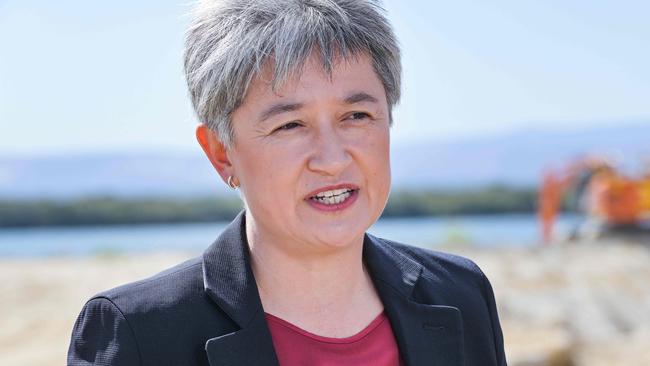Foreign Affairs Minister Penny Wong says Australia’s subs will set nuclear non-proliferation standard for other nations
Australia will set a strong arms control precedent for other nations seeking nuclear-powered submarines, says Foreign Affairs Minister Penny Wong.
SA News
Don't miss out on the headlines from SA News. Followed categories will be added to My News.
Australia will set a pioneering precedent in guarding against atomic weapons build-up for other nations that might seek nuclear-powered submarines, vows Foreign Affairs Minister Penny Wong.
In an interview with The Advertiser, Senator Wong revealed her department was working “very closely” with the International Atomic Energy Agency to maintain the nation’s “impeccable” non-proliferation record for the Adelaide-based nuclear-powered submarine project.
Australia wants to become the first nation to have nuclear-propelled submarines that does not have nuclear weapons – six other countries now have both. World leaders are gathering in Hiroshima, the first military target of a nuclear weapon, for the G7 Summit.
The first round of negotiations started on May 9 in Canberra, during IAEA deputy director general Massimo Aparo’s Australian visit.

China has accused the AUKUS submarine partners of breaching nuclear weapons control treaties and warned handing the technology to Australia risks damaging the “international non-proliferation system”.
Domestic defence industry has privately aired concerns that the IAEA process could drag out and delay the Adelaide nuclear-powered submarine construction.
But Senator Wong said Australia was “engaging in positive and constructive negotiations” with the IAEA and had been working before the March 14 San Diego announcement of an optimal pathway for the $368bn program for at least eight Adelaide-built nuclear-powered submarines.
“Well before the optimal pathway was announced, we were working with the IAEA, to develop a robust non-proliferation approach to underpin Australia’s nuclear-powered submarine program,” Senator Wong said.
“We are pleased with how these discussions are progressing. Australia is committed to transparency and setting the strongest precedent for states that might also seek naval nuclear propulsion.”
But she conceded this accreditation process was “lengthy and complex”, both from technical and diplomatic levels.
Senator Wong said Australia was aware of the sensitivity about nuclear issues and had engaged closely and transparently with the Pacific region about nuclear propulsion and associated waste disposal.
“We know for example, nuclear issues are sensitive in the Pacific. That’s why we’re working very closely with the International Atomic Energy Agency to have the highest safety standards associated with these submarines to maintain Australia’s impeccable record when it comes to nuclear non-proliferation,” she said.
“So, we believe this is an investment in stability and we will be upfront and transparent with our partners, and we will ensure that the highest level of assurances in relation to nuclear non-proliferation are maintained.”
Asked by The Advertiser how she explained to China why the Adelaide-based submarine construction program would not further erode trade, Senator Wong said Australia was not dramatically expanding its fleet.
“I think it’s useful to go to the facts. Australia currently has six submarines – with AUKUS we’re replacing an existing capability with a new capability. Our plan is for a nuclear-powered submarine fleet of eight boats,” she said.
“I’d note that China has tripled its navy in the last 20 years. Those are facts on the ground, or in the oceans.
“But we want to continue to engage and we want to manage the bilateral relationship in a way that enables both countries to continue to grow that relationship, managing their differences wisely.”
Senator Wong told The Advertiser that Australia had to accept that it could co-operate with China in some areas and disagree in others, but needed to grow the bilateral relationship.
“But, in order to do so, both countries will need to navigate our differences wisely. We are clear about why we are investing in this capability. But we are also clear with China that we are open to engagement, we want to continue to engage,” she said.
“We’ve been very public about our view about the impediments in trade between the two countries. It’s in both countries’ interests for those impediments to be removed.”
Senator Wong said the nuclear-powered submarine fleet would help maintain peace and stability in the region, which was Australia’s intent.
“We want stability. We want countries to observe rules and norms and how they manage disputes. We want fair and open trading arrangements, which are predictable. So how we think of our capability is to support, regionally, those qualities,” she said.
More Coverage
Originally published as Foreign Affairs Minister Penny Wong says Australia’s subs will set nuclear non-proliferation standard for other nations





